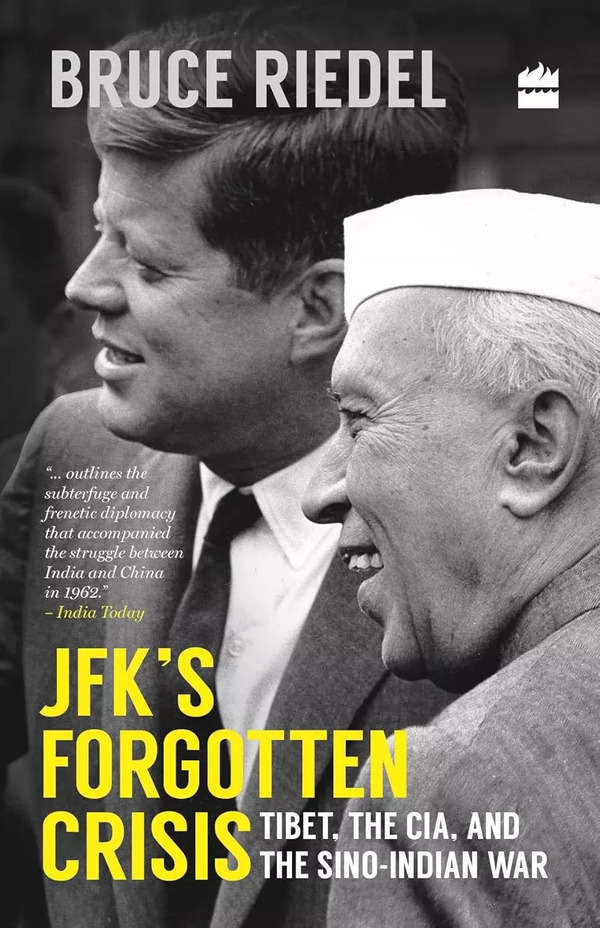During his reply to the Motion of Thanks during the Budget Session, PM Modi made several interesting cultural references. The first involved a famous TOI cartoon by R.K. Laxman, which showed the ubiquitous “common man” dragging a float with an aeroplane carrying a group of politicians, where the pilot closely resembles former Prime Minister Rajiv Gandhi.
Another reference was the book JFK’s Forgotten Crisis: Tibet, the CIA, and the Sino-Indian War by Bruce Riedel, a former CIA officer and senior fellow at the Brookings Institution. The book examines the 1962 Sino-Indian War and its profound impact on US foreign policy under President John F. Kennedy.
Historical Context
The early 1960s were marked by intense geopolitical rivalries shaped by the Cold War. The world was divided between the Western bloc, led by the United States, and the Eastern bloc, dominated by the Soviet Union, with newly independent nations like India trying to carve out a neutral space through the Non-Aligned Movement. Nehru was one of the movement’s key architects, advocating for peaceful coexistence and diplomatic engagement rather than aligning with either superpower.

However, China’s rise as a communist power under Mao Zedong presented new challenges. After the 1949 Communist Revolution, China became increasingly assertive in its foreign policy, particularly concerning territorial disputes. The relationship between India and China, once symbolised by the slogan “Hindi-Chini Bhai Bhai” (India and China are brothers), deteriorated due to border disagreements, especially in Aksai Chin and Arunachal Pradesh . The situation was further complicated by India’s asylum to the Dalai Lama following the 1 959 Tibetan uprising, which strained Sino-Indian relations.
Amid these tensions, the world witnessed other critical events: the Cuban Missile Crisis unfolded in October 1962, bringing the US and the Soviet Union to the brink of nuclear war. It was during this volatile period that the Sino-Indian War erupted, creating a parallel crisis that is often overshadowed in historical narratives.
Nehru’s Leadership During the Crisis
Riedel’s book paints a nuanced portrait of Nehru, depicting both his visionary ideals and the strategic miscalculations that contributed to India’s unpreparedness for the 1962 war. Nehru’s foreign policy was rooted in moral diplomacy, non-alignment, and the belief that India could maintain peaceful relations with both the Western and Eastern blocs. However, JFK’s Forgotten Crisis argues that Nehru’s idealism left him blindsided to the realpolitik of China’s territorial ambitions.
Riedel critiques Nehru’s overreliance on diplomacy, which led to complacency in addressing the growing military threat from China. Despite intelligence reports and clear signs of Chinese aggression along the Himalayan border, Nehru underestimated the likelihood of an armed conflict. When the People’s Liberation Army launched a surprise, well-coordinated offensive in October 1962, Indian forces were ill-prepared, poorly equipped, and unfamiliar with high-altitude warfare.
The war was a personal and political blow to Nehru. It exposed the weaknesses of India’s defence policy and shattered his belief in the power of diplomacy to resolve conflicts with authoritarian regimes. Riedel describes how the defeat deeply affected Nehru’s morale and public image, as he faced criticism both domestically and internationally for India’s lack of preparedness.
Nehru’s Pragmatic Turn: Seeking US Assistance
One of the pivotal moments Riedel highlights is Nehru’s decision to seek military assistance from the United States. This was a significant shift, as Nehru had previously maintained a distance from the US, wary of its Cold War alliances and interventionist policies. The crisis forced Nehru to prioritise national security over ideological consistency, demonstrating his capacity to adapt under pressure.
Nehru’s appeal to President John F. Kennedy marked an unprecedented moment in Indo-US relations. Despite being preoccupied with the Cuban Missile Crisis, Kennedy responded swiftly, recognising India’s strategic importance as a democratic counterbalance to communist China in Asia. The US provided military aid, including weapons, ammunition, and logistical support, which helped stabilise India’s defence capabilities in the immediate aftermath of the conflict.
Riedel notes that although Nehru’s request for help was born out of desperation, it laid the groundwork for a brief period of closer Indo-US ties. The personal rapport between Nehru and Kennedy grew during this time, with Kennedy’s quick response helping to bridge the ideological divide between the two leaders. However, the momentum was short-lived following Kennedy’s assassination in 1963.
Nehru’s Legacy Post-1962
While JFK’s Forgotten Crisis critiques Nehru’s missteps, it also acknowledges his role in steering India through the aftermath of the war. The defeat catalysed major reforms in India’s defence policy, including a significant military build-up and a strategic reassessment of foreign relations. Nehru oversaw these changes, recognising the need for a stronger military to complement India’s diplomatic efforts.
Riedel argues that the 1962 crisis was a turning point not just for India, but for global geopolitics. For Nehru, it was a harsh lesson in the limits of idealism in international relations. The war forced him to confront the complexities of power politics, balancing India’s moral principles with the pragmatic demands of national security.
